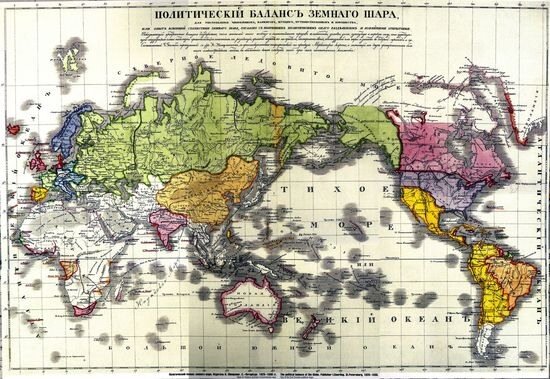
The analysis of the main trends of the development of the current geopolitical situation shows that a new multi-polar model of the world's establishment is being formed, within which apart from the USA there appear new centres of forces, including People's Republic of China, European Union, India, Brazil, Russia, etc. Individual interests of each of these countries do not coincide in political, economic, security and other spheres, which leads to confrontation among them both, on the world and regional levels, and as a result, to increasing of instability in the world, unleashing wars or armed conflicts. Meanwhile, decrease of the efficiency of the performance of the leading international organizations (UN and OSCE) can be observed in the political solution of problems existing in the security sphere. This is confirmed by military conflicts in Afghanistan, Iraq, Libya and Georgia as well as by the course of events around Syria and Iran.
New centers of power in the world
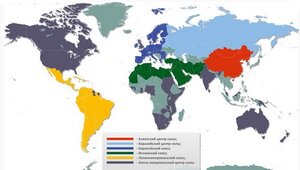 As a result, such deepening of processes of globalization makes leading countries look for certain compromises in order to solve global problems of the world's security. An example of such a compromise is the “New Start” agreement between the USA and Russian Federation, which guarantees further control and introduction of limits for strategic nuclear arms.
As a result, such deepening of processes of globalization makes leading countries look for certain compromises in order to solve global problems of the world's security. An example of such a compromise is the “New Start” agreement between the USA and Russian Federation, which guarantees further control and introduction of limits for strategic nuclear arms.
As to the widening of financial, economic and trade relationships between different countries, development of global transport networks and telecommunications, they all both facilitate growth of the world economy and create preconditions for large-scale financial-economic crises. The latest one of such crises began in 2008 and keeps impacting most countries' economies.
USA as the Engine of Geopolitical Changes
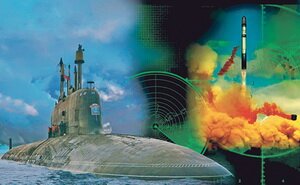 The main driving force of the above mentioned processes is the USA, which leads quite effective policy of preserving and increasing its own geopolitical positions, despite its own existing problems (such as worsening of the state of the American economy due to the world economic crisis, complication of relationships with its NATO allies, time elongation of the military operation in Afghanistan). This is confirmed by a line of strategic actions of the USA, comparable with the sequences of the WWII or disintegration of the USSR. Thus, recently the USA has managed to reach a number of revolutionary improvements in most important spheres, considering its national interests, such as:
The main driving force of the above mentioned processes is the USA, which leads quite effective policy of preserving and increasing its own geopolitical positions, despite its own existing problems (such as worsening of the state of the American economy due to the world economic crisis, complication of relationships with its NATO allies, time elongation of the military operation in Afghanistan). This is confirmed by a line of strategic actions of the USA, comparable with the sequences of the WWII or disintegration of the USSR. Thus, recently the USA has managed to reach a number of revolutionary improvements in most important spheres, considering its national interests, such as:
- in the military and military technological spheres – as a result of implementation of fundamentally new concepts of conducting military actions (in particular, network-centric, aerospace, cyber, etc), as well as the development and introduction of modern types of weapons, materiel, which by their characteristics leave behind those of its potential enemies, together with new reusable battle space systems, systems of high-precision weapons, laser strike systems, robotized and unmanned multiple-functional aircraft of the 5th generation, stationary and mobile means of air defence, etc;
- in the energy sphere – through the development and wide introduction of new energy technologies, including extraction of shale hydrocarbons; transition to a flexible system of production, transportation and use of the liquefied gas instead of the rigid stationary networks of trunk pipelines; energy saving and using renewable and non-traditional sources of energy;
- in the informational sphere – a quality leap in the development of telecommunications and cyber technologies enabled to increase the perceptible effect of the USA on other countries, especially on their governments, effectively organizing and supporting mass social unrests, as well as interfering with functioning of state, military and industrial systems of automated command and control.
In general, the USA managed to strengthen substantially its own security (military, economic and information included) and increase its offensive capabilities for achieving its geopolitical aims. Currently, such aims include measures for securing results achieved by the "cold war", further strengthening its leadership, as well as neutralizing challenges and threats from potential enemies or geopolitical opponents.
Here the main efforts of the USA are being concentrated on the following directions:
- ensuring political, economic and military presence of the USA in the key regions of the world;
- suppression of economic, military and political growth of other power centres (China and EU in the first place);
- further weakening of the role of Russia and limiting its geopolitical influence, preventing its reintegration into a powerful state of the world.
According to some opinions (those of Western experts included), at the current stage one of the ways of achieving the desired goals is the implementation by the USA a so called "controlled crises and conflicts" strategy in regions of the world, involving American allies and partners who have their own regional interests. Such allies and partners are considered to include NATO member states, as well as Sunni countries of the Middle East.
The strategy of managed crises and conflicts (strategy of controlled chaos)
Examples of this strategy can be military operations of the USA and its allies in Iraq, Afghanistan, Libya and the supported or actually provoked social clashes in the countries of Northern Africa and the Middle East (so called "Arab Spring"). Despite some sufficient problems, the USA did achieve certain goals, such as:
- strengthening of its positions in regions of Northern Africa and Middle East through the overthrows of anti-American regimes in Iraq, Afghanistan and Libya, as well as removing from power leaders of Tunisia, Egypt and Yemen, not fully controlled by Washington;
- a wider access of the USA and its allies to Iraq and Libya's oil and gas deposits and markets (of weapons included) of Northern Africa and Middle East countries;
- weakening of the influence of Russia in Northern Africa and Middle East regions through the removal from power of the regimes supporting partnership with Russia (primarily, Muammar Gaddafi in Libya and Hosni Mubarak in Egypt);
- creating preconditions (the so called domino effect) for spreading social unrests in other countries of the Middle East (primarily, Syria, Iran, Lebanon and Jordan), as well as working out mechanisms for getting benefits from them.
By implementing the above mentioned strategy, the USA and its European and Middle East allies support actions of Syrian opposition forces against the regime of President of Syria B. Assad, whose removal from power will allow the USA to continue strengthening its positions in the Middle East, and will also facilitate (considering allied relations between Syria and Iran) achieving its strategic goal to disrupt the Iranian nuclear programme and replace the Islamist authorities of Iran. This will eliminate Iranian nuclear missile threats to the USA and its allies, primarily Israel. The situation with the balance of powers in the Middle East will also change. The positions of the USA and its partner Sunni countries (primarily, Turkey and Saudi Arabia) in the region will strengthen, with simultaneous further weakening of influence of Russia who will lose its last partners in the region (Syria and Iran). The USA and its European allies will get direct access to the Central Asia and Southern Caucasus that will reinforce its influence on these regions and push Russia out of them. Positive conditions will appear to implement the American-European initiative on "The New Silk Road", as well as to strengthen energy security of the EU through establishment of new energy transporting corridors from Europe to Central Asia bypassing the Russian Federation. The USA will be able to control the main sources of energy supply to PRC (from Iran and Northern African countries), and subsequently will influence economic progress of China.
According to the independent experts, the USA also makes use of the processes linked to the world economic crisis. By influencing these processes, on the one hand, it manages to provoke social unrests in so called problem countries, and on the other hand, both to restrain EU and to weaken Russia and PRC, and its other opponents.
The Greater Middle East
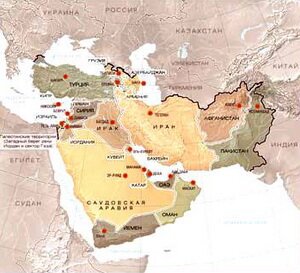 All this leads to global geopolitical changes in the whole Eurasian area and the so called Greater Middle East, strengthening positions of the USA from Northern Africa to Central Asia, allowing it simultaneously to deepen the isolation of Russia from Southeastern direction and considerably downsize its role in the energy supply of Europe, which will extremely negatively impact the Russian economy, as well as substantially complicate implementation of Russian strategic plans to create the Eurasian Union.
All this leads to global geopolitical changes in the whole Eurasian area and the so called Greater Middle East, strengthening positions of the USA from Northern Africa to Central Asia, allowing it simultaneously to deepen the isolation of Russia from Southeastern direction and considerably downsize its role in the energy supply of Europe, which will extremely negatively impact the Russian economy, as well as substantially complicate implementation of Russian strategic plans to create the Eurasian Union.
The US presence (including military) near the Western borders of PRC will increase, which will become an important manifestation of the new US strategy for the restraint of China’s influence from the Eastern direction to the Asia-Pacific region.
All the listed measures of the United States give a new impulse for the development and activity of North Atlantic Alliance as the main tool for implementing American interests. Considering changes in the development of the world military political situation, the leaders of the Alliance continue to focus their primary efforts on the implementation of the new NATO Strategic Concept, approved at the Lisbon Summit in November 2010. First of all, it deals with the development of military strength and transformation of the NATO military structures in order to ensure its ability to perform tasks for protection of national territories of the member countries and participation in operations on other theatres of war; deployment of the US/NATO Air Defence in Europe; end of the military operation in Afghanistan; continuing the NATO expansion to Western Balkan countries (Montenegro, Macedonia and Bosnia and Herzegovina) and developing cooperation with the Alliance partner countries, including Ukraine. However, despite a number of contradictions, the NATO's cooperation with the Russian Federation continues, particularly on issues of the stabilization of the situation in Afghanistan, as well as fighting terrorism, sea piracy and drug trafficking.
On this background the important issues in the NATO's activity deal with reducing military expenditures by member countries due to sharpening of their internal economic problems (which automatically reduces operational and combat capabilities of the Alliance), as well as due to internal divergences in views of the Northern Atlantic Alliance member countries on the aims and prospects of its activity. At the same time, as Libyan events have demonstrated, NATO alone (without the USA) is not able to conduct military operations of the medium duration and intensity.
The Chinese Approach to Reaching the World Potential
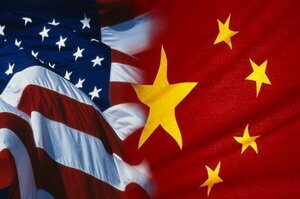 Lately China has been holding firmly its positions of the world's second centre of force. By actively increasing its military power and developing its economy, it is catching up with the capacity of the USA. PRC is not positioning itself as a world leader yet, but is concentrating its efforts on strengthening its positions in Asia-Pacific region (APR), Southeastern Asia, Central Asia and in neighboring Eastern Siberia and Far East regions of Russia. Aiming at this, China takes successive measures of military, political and economic nature, which are the following:
Lately China has been holding firmly its positions of the world's second centre of force. By actively increasing its military power and developing its economy, it is catching up with the capacity of the USA. PRC is not positioning itself as a world leader yet, but is concentrating its efforts on strengthening its positions in Asia-Pacific region (APR), Southeastern Asia, Central Asia and in neighboring Eastern Siberia and Far East regions of Russia. Aiming at this, China takes successive measures of military, political and economic nature, which are the following:
- holding back regional opponents of PRC (USA, India, Japan) by the Chinese military presence in APR through developing a system of naval and aircraft bases in the region and strengthening its navy (equipping it with aircraft carriers, nuclear submarines and striking missile ships) and widening the geography of its activity;
- deepening economic cooperation with countries of the above mentioned regions. China pays special attention to Central-Asian energy supplies and natural resources;
- implementation of projects jointly with Russia dealing with development of natural resources of the Far East and Eastern Siberia as well as demographic expansion into the mentioned regions of Russia.
The list of the directions of China's activity can be complemented with the following priorities: holding and increasing Chinese positions at the US markets (the USA remains the main trade partner of PRC); financial and economic expansion in the countries of Europe, Africa and Latin America by stimulating credit and investment activity, getting a wider access to natural resources of other regions of the world, including the Middle East, Africa and South America.
Military parade in Pekin to celebrate the 60th anniversary of China 01.10.2009
However, intensification of China's activity in achieving these goals is accompanied with the increase of regional contradictions between China and the USA, India and Russia. Besides, PRC's relations with Japan, Vietnam and the Philippines become complicated due to disputed islands which are rich for hydrocarbons shelf zones in East Chinese and South Chinese Seas.
The current internal problem of PRC is over-tension of the Chinese economy, which makes the authorities of China slow down the pace of the economic development of the country (until recently it was considered the highest in the world despite the negative consequences of the world financial crisis).
The Russian Federation: Devotedness to the Inherited Ideals
The Russian Federation, which considers itself a great world leader, like the USA and other world centres of force, protects its own interests.
So, the Russian Federation's strategic goals in particular are the following:
- maintaining the military parity with the USA and NATO by means of upgrading and development of Russia's Armed Forces, primarily, their nuclear-missile forces;
- re-establishment of the RF's control of the post-Soviet territories through the implementation of Russian initiatives regarding strengthening of the Collective Security Organisation, widening the Customs Union, and, as a result, creating Eurasian Union in the context of realization of V. Putin's strategic idea of restoring Russian empire or the USSR;
- uniting other countries around Russia which have contradictions with the West or those keeping independent positions from the USA and Europe (so-called countries of the third world);
- strengthening Russia's positions in Europe and Asian-Pacific region, preserving Russia's presence in the Middle East and Northern Africa.
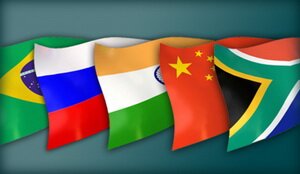 For this purpose Russia increases unprecedentedly the amounts of expenses on rearmament of its Armed Forces – up to around 36 trillion roubles for the period to 2020. It also increases political, economic and informational pressure on countries of the former USSR, in particular, it secretly supports permanent tension in the zones of "frozen conflicts" in Trans-Dniester, Abkhazia, South Ossetia, Nagorno-Karabakh. It activates its work in the Shanghai Organization of Cooperation, BRICS countries (Brazil, Russia, India, China and South Africa), and other regional organizations, like in the Pacific Economic Cooperation Organization. It deepens economic cooperation with the countries of EU, APR, the Middle East and Northern Africa, and also supports its Middle East partners (primarily Iran and Syria in their confrontation with the USA and its allies).
For this purpose Russia increases unprecedentedly the amounts of expenses on rearmament of its Armed Forces – up to around 36 trillion roubles for the period to 2020. It also increases political, economic and informational pressure on countries of the former USSR, in particular, it secretly supports permanent tension in the zones of "frozen conflicts" in Trans-Dniester, Abkhazia, South Ossetia, Nagorno-Karabakh. It activates its work in the Shanghai Organization of Cooperation, BRICS countries (Brazil, Russia, India, China and South Africa), and other regional organizations, like in the Pacific Economic Cooperation Organization. It deepens economic cooperation with the countries of EU, APR, the Middle East and Northern Africa, and also supports its Middle East partners (primarily Iran and Syria in their confrontation with the USA and its allies).
Russia continues to consider one of the most effective tools for the implementation of its foreign policy, the energy factor as a means of pressure on other (post-Soviet included) countries. Its use is accompanied with informational measures, increasing its ability to move forward and protect Russian interests.
Due to the above mentioned methods, Russia has already achieved some important results, like the increase of its influence on the post-Soviet territories and in Europe, implementation of some energy projects which widen its presence at the energy market of Europe and lower the transit dependence on Ukraine (in particular, through building the first part of the "Nord Stream" gas pipeline), and insuring its military presence in a number of CIS countries in the long term.
At the same time, Russia has some substantial problems, negatively influencing the effectiveness of its foreign policy and its internal stability. To mention a few:
- critical dependence of Russia's economy on gas and oil export as well as noticeable technological lagging behind (in military technological sphere included) as compared with leading Western countries;
- maintaining national interests by most of post-Soviet countries, which slows down the implementation of Russian integration initiatives at the post-Soviet territories;
- growing of threats from PRC (through the spread of the Chinese influence in the Eastern Siberia and Far East regions of the RF) and also growing activity of the Islamic extremism in Afghanistan and Pakistan (especially if we consider the plans of withdrawing of the ISAF from Afghanistan's territory by the end of 2014);
- Russian domestic political problems remaining and getting more complicated, among them we can single out the following: protest mindedness of a part of the population and activeness of the opposition; Islamic extremism in the Northern Caucasus and its intensification in those regions of Russia where Muslim population makes up majority (like in the Volga region); a complicated demographic situation;
- With all this as the background, increase of firmness of the Russian policy in protecting its interests from the West (with the return of V. Putin to the post of President) is leading to complication of Russia's relations with the USA and NATO. The most important current problems in the relations of the sides are the USA and NATO's plans of deployment of Air Defence in Europe, as well as the steps taken by the USA and their allies for the removal of the authorities in Syria and Iran, which cause negative reaction of the RF. Besides, the contradictions between Russia and the West remain where it goes to the influence on the post-Soviet territories, limiting conventional arms in Europe and access to the Caspian and Central Asia's energy resources.
The European Union: Unity is Force
The European Union positions itself as a separate power of the sub regional level – a powerful union of countries with the common foreign and defence policy, the unified currency (Euro) and consistent rules of economic activity. At the same time, the main geopolitical and economic partner of the EU is still the USA, for the reasons of common interests of the two sides, despite attempts of some European countries (primarily, France and Germany) to increase Europe's role in regional and world processes.
How to change the borders of Europe for the last 1000 years
However, today a substantial problem for the EU is worsening of the economic state in most of the member countries. The most difficult situation is observed in Greece, Italy, Spain, Portugal and Romania. The engine of growth of the EU economy, as usual, is still Germany, France and the United Kingdom; although one should admit that they also suffer from economic problems. This is what weakens unity of the EU, sharpens internal contradictions on determination of ways to overcome the economic crisis, slows further expansion of the EU because of disapproving attitude of the leading members of the European Union to the acceptance of required subsidies by the new countries. The abilities of the EU to implement programmes of its economic development, strengthening of the European defence component and development of cooperation with partner countries are significantly decreasing.
European Union: Past, Present, the prospect of increased
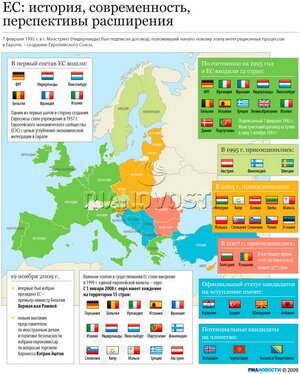 For this reason, today, the European Union authorities direct its main efforts specifically at solving economic problems. In particular, for this reason it improves financial discipline in the EU countries, firmly limiting the deficit of their state budgets; grants the European Central Bank wide privileges in the issues of bank activity control in the EU countries; creates special financial funds to help those EU members which are in the most rough situation; cares about the development of the economic and monetary unions of the EU, the diversification of economic connections of the European Union, particularly by developing cooperation with China, India and other countries whose economy is more stable.
For this reason, today, the European Union authorities direct its main efforts specifically at solving economic problems. In particular, for this reason it improves financial discipline in the EU countries, firmly limiting the deficit of their state budgets; grants the European Central Bank wide privileges in the issues of bank activity control in the EU countries; creates special financial funds to help those EU members which are in the most rough situation; cares about the development of the economic and monetary unions of the EU, the diversification of economic connections of the European Union, particularly by developing cooperation with China, India and other countries whose economy is more stable.
It is worth admitting that these measures (primarily, in reducing social expenses and allocating money to the financial funds of the EU) are accepted by EU members ambiguously, and in some countries cause even mass protests of people and subsequently change of the government (Italy and Greece, in particular). But the European Union authorities, attempting to strengthen the EU, consider it proper to adhere to the chosen directions of its activity. In particular, it concerns improving the energy security of the EU by diversifying sources of energy supply (primarily, by implementing projects to create the "Southern energy corridor" and expanding opportunities of using liquefied gas); the transition to alternative sources (wind, solar energy and biofuel); applying energy saving technologies; the integration of energy markets and energy transportation infrastructure of the EU countries; preventing the monopolization of the European energy sector (implementation of the "Third energy package" of the EU and anti-monopoly investigation of “Gazprom” in Europe).
The European Union makes necessary efforts for the implementation of strategies and programmes on the joint European security, as well as for the expansion of cooperation with EU partner countries. First of all, it deals with the Common Security and Defence Policy (it anticipates strengthening the European defence component and participation of the EU in international peacekeeping, counter-terrorist and anti-piracy operations), as well as the European Neighborhood Policy (it includes such EU programmes as the "Eastern Partnership" for post-Soviet countries, including Ukraine, and the “Mediterranean Union" for Mediterranean and a number of Middle Eastern countries).
Another asset of the EU authorities could be considered the European Union expansion process, centred (currently) on the Western Balkan countries, namely: Croatia, Macedonia, Montenegro, Albania, Bosnia and Herzegovina and Serbia.
The EU also considers another not less important direction of its activity which is the development of cooperation with the Russian Federation. This cooperation has dynamic, yet quite complicated, and sometimes even contradictory nature and involves political, energy and security components.
Important Regional Links of the World's Common Chain
In geopolitical processes connected with growing of world's regional centres of force, other globally important factors get activated. Namely: uncontrolled spread of nuclear and missile technologies (like implementation of Iran and North Korea's nuclear-missile programmes which either contemplate or allow production and delivery of nuclear weapons); international terrorism; sea piracy; organised and transnational crime; weapon and drug smuggle; human trafficking and illegal migration.
Of great importance become:
- Asia-Pacific region, which has a chance to become the main business, economic and financial centre of the world due to economic growth of PRC, India, Indonesia and some other countries. At the same time, this process is accompanied with the increase of tension in the region, which can be explained by straining of regional contradictions of the world's leading countries, and by differences in opinions and actions of the countries of APR themselves;
- Africa, where the leading countries of the world are trying to get access to its natural resources, which leads to greater tension, new armed regional conflicts (in particular, in the Democratic Republic of Congo, Ivory Coast, Libya, Mali and armed confrontation between Sudan and Southern Sudan);
- South America, where Brazil and Argentina, as they grow stronger, form their own centre of regional development. This growing power will allow them in the future to come out onto a basically new, world level;
- Caspian region and Central Asia, where leading countries of the world are trying to get access to local oil, gas and other natural resources and to take possession of the ways of their transportation. This, on the one hand, stimulates economic development of the above mentioned regions, but on the other hand, strains regional contradictions, which become sources of tension and lead to conflicts. Besides, Central Asia experiences the impact of extremism from Afghanistan and Pakistan.
- Middle East remains, today, one of the main sources of threat to the world's security. This can be explained by social unrest and conflicts there, by growing tension around the nuclear programme of Iraq and by unsolved Arab-Israeli problems. At the same time, the Middle East attracts attention also as a place of concentration of the world's energy supplies and as a promising market;
- Balkan Peninsula, which continues to be a source of instability in Europe due to unsettled Serbia-Kosovo relations, inter-ethnical confrontation in Kosovo and unsolved domestic political problems in Bosnia and Herzegovina.
Ukrainian problems at the crossroads
Describing the situation regarding Ukraine, we should consider the following factors:
- continuation of confrontation between the USA, NATO, EU and Russia for the influence at the post-Soviet space and Black Sea region, accompanied with the increase of political and military activity around our country;
- authoritarianism of the Russian authorities, activity and aggressiveness of Russian foreign policy are increasing;
- Turkey, Poland and Romania activate their efforts in strengthening their regional positions;
- nationalistic mindedness of some of the population of Ukraine's neighbouring countries grows (for example, in Hungary and Romania);
- conflicts in Transnistria, Abkhazia, Southern Ossetia remain "frozen", instability in the Northern Caucasus of Russian Federation also remains, Kurd extremists in Turkey are becoming more active.
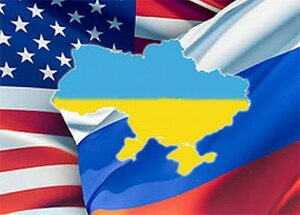 These facts and circumstances show that Ukraine is on the crossroads of interests of the West (USA/NATO and EU) and East (Russian Federation), and is subject to active determined pressure from both sides, trying to involve our country into the sphere of their influence, counting on Ukraine's potentially powerful economic, military strength, which the above mentioned centres of force would not mind to use for achieving their own geopolitical goals.
These facts and circumstances show that Ukraine is on the crossroads of interests of the West (USA/NATO and EU) and East (Russian Federation), and is subject to active determined pressure from both sides, trying to involve our country into the sphere of their influence, counting on Ukraine's potentially powerful economic, military strength, which the above mentioned centres of force would not mind to use for achieving their own geopolitical goals.
In strategical aspect it regards:
- Russian Federation's intention to establish an absolute control over Ukraine, which is important for restoring Russia's role of a great world nation and leader (at this point of time) of the so-called Eurasian Union;
- Intentions of the USA, NATO and EU not to let these intentions of Russian Federation come true, as Russia objectively remains their main geopolitical opponent. At the same time, European countries are trying to turn Ukraine into a certain buffer zone between their own territories and Russia.
Under such circumstances, absence of precise and purposeful domestic and foreign policy of Ukraine, and also actual division of the Ukrainian society into two parts – Western and Eastern ones, – make conditions for complete split of our country, and, as a result, losing its very statehood. This is testified by the unprecedented increase of Russia's pressure (political, economic, and informational) at the moment when the West is concentrated on solving its own problems caused by the world economic crisis. In addition to all this, we can see actual yielding of Ukraine by the USA and member countries of NATO and EU. Having supported our course of Euro-Atlantic integration of our state at one time, they now have actually blocked its implementation.
As a result, Ukraine still hasn't realized its powerful potential and thus hasn't taken a worthy place in the world, having turned into an unstable "grey zone" between the West and East. To all this, since having gained its independence, Ukraine kept losing:
- nuclear weapons – the third nuclear potential in the world by the amount, which at its time was the basis of Ukraine's security;
- population – about 7 million people, that is 13 percent of the citizens of the country (nearly like in the times of Holodomor or WW II);
- high tech industry – the basis of the powerful leading industries of the former Soviet Union;
- vital territories – rich oil and gas deposits on the Black Sea shelf around Zmiyinyi Island;
- Ukrainian cultural and information spaces – which partially or completely are under the aegis of Russian Federation;
- control over Ukraine's main economic assets – energy infrastructure, metallurgic industry, nuclear energy, ship and aircraft building branches, defence industrial complex.
The Non-Alternative Orienting Point: National Interests of Ukraine
Ukraine could have avoided all this, had it chosen the way of building of the state which was chosen by other post-Soviet and post-socialist countries that really cared about their own national interests.
Typical examples are Russia, Poland and Romania, who over the recent years have settled the following main goals:
- Russian Federation – to restore the country as a great world nation, securing its leading positions in the post-Soviet space;
- Poland – to make the country a leader in Central and Eastern Europe and the main support of the USA and NATO in the region;
- Romania – to get leading positions in Southeastern Europe and in the East of the Balkan Peninsula, as well as to get a role of the bearer of the USA, NATO and EU's interests in the Black Sea region.
Thanks to the purposeful efforts in reaching their above mentioned goals, Russia, Poland and Romania actually have realized their national interests or have created stable prerequisites for their realization. This cannot be said about Ukraine, which, on the contrary, is approaching the line on crossing which the country's independence together with statehood can be lost.
The only conclusion from the above said is as follows: Restoration of Ukraine and its taking an important place in the world is possible only if it concentrates its main efforts on achieving the strategic goal of turning into a powerful unitary state – a regional leader, capable of guaranteeing security and high standards of life of its citizens.
This, and not the ghostly choice between West and East, should become the uniting idea for the Ukraine's society. All other ideas or projects can inevitably lead to splitting and disintegration of Ukraine, which Ukrainian history has testified so many times.
Today, Ukraine actually has another (and perhaps the last) chance in its history, which it can use in favour of its statehood, only on the basis of the above mentioned approaches. Taking into consideration current realities, Ukraine should take the following steps:
in the sphere of domestic policy – to secure stability, democratic development and lawful order in the country as the basic conditions for effective work of all branches of the state power and to achieve harmony in the society, so that all the strata of the population could be sure in the future of positive development of the state of Ukraine. All the above mentioned is possible only on the achievement of the consensus among all the political forces of Ukraine on the basis of the principle of patriotism and preserving Ukraine's statehood, with securing absolute, without exceptions, effectiveness of the Ukrainian law. (Here the first priority task is determined struggle against corruption, separatism, attempts to federalize Ukraine, political extremism and other anti-Ukrainian activities);
in the sphere of international policy – Ukraine should leave the "grey zone" between the East and West and become as a state an independent subject of international relations, capable of championing its own national interests. First of all it needs:
- balanced development of relations with the USA/NATO/EU and Russia/CIS, as well as gradual continuation of the processes of European integration of Ukraine;
- active co-operation with the USA and NATO, together with signing the agreement of the Association with the EU and increasing the cooperation with the European Union within the "Eastern Partnership" programme;
- equal and mutually beneficial cooperation with Russia in political, economic and security spheres, but without joining any integration units within CIS controlled by Moscow;
- giving practical significance to the work of the GUAM group, preserving the leading role of our country in it, as well as activation of Ukraine's participation in other international and regional organizations;
- actively supporting Ukrainian diaspora in order to preserve its self-identity and to create new channels for the advancement of Ukrainian interests in other countries;
in economic and social spheres – turning Ukraine into an economically developed and independent country, integrated into the world economy and European energy and transport systems, able to guarantee its own economic (primarily, energy) security and sufficient well being of its citizens. For this, it is necessary to do the following:
- to take urgent measures for diversification of sources and ways of getting new energy resources. At this point of time the immediate goal is achieved by creating a liquefied natural gas terminal, integrating Ukraine's gas transporting system into the European pipeline network, wider use of alternative types of energy (mainly shale gas, biological fuel, wind and solar energy), as well as energy-saving technologies;
- to improve the investment climate in Ukraine by means of increasing the transparency of the Ukrainian financial and economic system. In the context of cooperation with foreign investors, it is necessary to give priorities to getting modern technologies, and thus to increase the competitiveness of Ukrainian goods at the internal and external markets. At the same time, within the limits of the above mentioned activity, not to allow any foreign control of the key branches of Ukrainian economy;
- to reconstruct and develop the transport infrastructure of Ukraine in order to use it wider in the system of international transport corridors. In this context special attention should be paid to the development of the commercial infrastructure of Sevastopol's harbours, which would secure the best conditions for the port functioning in the whole Black Sea;
- to create necessary conditions for unimpeded cooperation with the International Monetary Fund and other world financial institutions for getting foreign credits and overcoming negative consequences of the world economic crisis;
in the security sphere – securing the sovereignty, territorial integrity and state and population's security, as well as Ukraine's becoming one of the guarantors of stability in Southeastern Europe and Black Sea and Caucasus region. In this aspect it is reasonable:
- to gradually reform the defensive part of the state according to existing or potential threats to the military security of Ukraine;
- to maintain the capability of the Armed Forces of Ukraine to protect the country from possible external aggressions, primarily by creating/increasing the components of holding back potential enemies, covering state borders, effective reacting of airmobile and special forces, strategic and operational-tactical intelligence;
- to optimize the system of location of the Armed Forces of Ukraine with concentration of the main military units at most threatened directions, primarily in the Crimea;
- to activate technological re-equipment of the Armed Forces, paying special attention to the development of the operational-tactical missile systems, means of air defence, highly precision weapons, striking and transport aircraft, as well as helicopters for various purposes, anti-tank systems, systems of volley fire, new models of armoured equipment, automated systems of command, control and communications, means of intelligence, involving, primarily, scientific-industrial potential of Ukraine in cooperation with countries of the West and using connections with Russia in military-technological sphere;
- to revise the strategy and tactics of fighting employment of the Armed Forces of Ukraine, on the basis of the experience of current wars and military conflicts, giving priority to mobile defence and special forces;
- to ensure compatibility of actions of the Armed Forces of Ukraine, command, control and communication systems, military equipment with Armed Forces of NATO and EU countries;
- to activate Ukraine's efforts in settling conflicts in Transnistria and Southern Caucasus and also in international peacekeeping and stabilization operations in other regions of the world;
- to make real Ukraine's duties regarding sending Ukrainian military units to NATO Response Force;
- to achieve an agreement with the USA, NATO and Russia about involving Ukrainian stations of warning about a missile attack in the US Anti-Missile Defence in Europe;
- to widen the participation in the Black Sea Harmony operation in controlling navigation in the Black Sea as well as in other activities of regional cooperation in fighting terrorism, piracy, international organised crime, illegal migration and illegal weapons and drug traffic.
In terms of practical realization of the above mentioned measures the most important issue for Ukraine is organization of active and aggressive informational campaign for championing its own interests and resistance to foreign informational influence. It was neglect of this issue that has become one of the main reasons of emerging internal and external problems for Ukraine, which particularly have recently intensified.
Based on the mentioned above, we need to pay attention to the complexity, dynamism and unpredictability of political, military and economic processes that occur in the world and influence the security and interests of Ukraine. Today, unfortunately, all these processes mostly are not favourable to improving the situation around our country, and on the contrary, they create new challenges to the world and regional stability as well as directly to Ukraine which actually is in the centre of the geopolitical confrontation between the West and the East with their civilizational values, political, economic and military systems.
In this essentially decisive situation for Ukraine that will determine its future destiny as an independent state, primary efforts of all citizens who are not indifferent to our state's future should focus on consolidation of the Ukrainian nation around the united national idea. As it was mentioned before, such an idea should be strengthening and development of Ukraine as a powerful regional state, able to champion its own interests reliably and to guarantee security. In its turn it needs unconditional keeping the basic fundamentals of Ukrainian statehood, particularly keeping unity, national self-identification of the Ukrainian nation and inviolability of its borders, preventing federalization of the country and attempts to grant the official status to other languages, renunciation of introduction of double citizenship, and also preventing loss of Ukrainian spiritual and cultural values under the influence of foreign powers.
